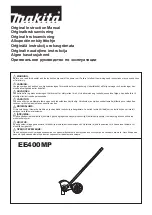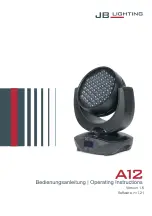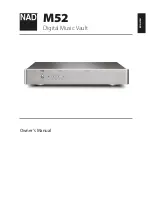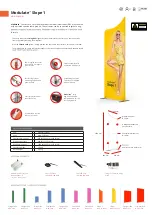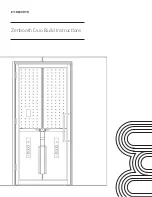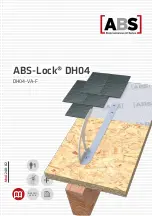
Page 2
INSTALLATION INSTRUCTIONS
CAUTION: Before installing, make certain the A.C. power is off and the FPS-HL unit connector is disconnected.
1. LAMPS OPERATED
The
FPS-HL
can be used with most 2
′
–8
′
lamps. Refer to the chart below for the type of lamp(s) operated and the number of
lamps to be operated in emergency mode. Contact Customer Service with questions about specific lamps.
*The lamp programming wires each have a 3 position shorting P-nut connector. Select the proper wire combination from
the chart above for the desired lamp(s) used. Cut and strip one of the selected wires (
3
/
8
″
) and plug it into the P-nut of the
second wire.
2. MOUNTING THE FPS-HL
Remove the ballast channel cover. Mount the
FPS-HL
on the fixture top in a position that does not interfere with the
existing A.C. ballast or any other hardware. Extend the flex conduit to a convenient location on top of the fixture and punch
a
7
/
8
″
hole. Feed the wires and flex connector down through the hole in the fixture and secure in place with the flex connec-
tor nut. An optional T-bar mounting kit is available to mount the FPS-HL above the ceiling tile adjacent to the emergency
fixture. To order the optional T-bar mounting kit (part number
TBMK-160
) contact Customer Service.
When battery packs are remote mounted, the remote distance can not exceed
1
/
2
of the distance from ballast to lamp
specified by the A.C. ballast manufacturer. For example, if the A.C. ballast manufacturer recommends no more than 25
′
remote distance, then the battery pack should not exceed 12
1
/
2
′
.
Under no circumstances should the battery pack exceed
a distance of 50
′
from the lamp.
3. WIRING
Refer to the wiring diagrams on the back page for the appropriate wiring of lamp(s) and ballast. Install in accordance with the
National Electrical Code and local regulations. For additional wiring diagrams consult Customer Service.
4. INSTALLING THE CHARGE INDICATOR
Recessed Troffer Fixture – Select a convenient location with proper clearance in the ballast cover and drill or punch a
7
/
8
″
hole (
1
/
2
″
knockout). Insert the
7
/
8
″
bushing into the hole. Push the plastic tube through the bushing. Disconnect the leads
from the
LED
housing and route the leads down the plastic tube. Reconnect the leads to the housing, observing the proper
polarity (Red lead to positive (+) red tab). Push the entire assembly back into the tube until the lens collar rests against the
plastic tube. The plastic tube should be adjusted so that the
Charge Indicator
is within ¼
″
of the fixture lens. The
Charge
Indicator
must be visible after installation. Refer to
Illustration 1.
Strip Fixture – Select a convenient location on the side of the fixture so the
Charge Indicator
can be seen after installa-
tion. Allow for proper clearance inside the fixture and drill or punch a
1
/
2
″
hole. Disconnect the leads from the
LED
housing.
Push the
LED
housing into the
1
/
2
″
hole until it is firmly locked in place. Reconnect the leads, observing the proper polarity
(Red lead to positive (+) red tab). Refer to
Illustration 2.
Illustration 1
Recessed Troffer Fixture
Illustration 2
Strip Fixture
FPS-HL
OBSERVE PROPER POLARITY
7/8" BUSHING
PLASTIC TUBE
CHARGE INDICATOR LAMP
BALLAST CHANNEL
COVER
FLEX CONDUIT
FIXTURE LENS
FIXTURE
CHARGE
INDICATOR
LIGHT
+ RED
LEAD
WHITE/RED
LEAD
FLEX CONDUIT
+ RED
FPS-HL
N
O
I
T
P
O
E
P
Y
T
P
M
A
L
Y
C
N
E
G
R
E
M
E
N
O
I
T
A
R
E
P
O
S
D
A
E
L
R
O
T
C
E
L
E
S
P
M
A
L
*
G
N
I
R
I
W
S
M
A
R
G
A
I
D
t
h
W
/
n
r
B
n
w
o
r
B
t
e
l
o
i
V
1
2
′
4
-
′
e
n
i
l
c
r
i
C
,
2
1
-
T
/
8
-
T
p
m
a
L
e
n
O
X
X
8
,
7
,
6
,
5
,
4
,
3
,
2
,
1
2
8
′
X
A
I
B
,
2
1
-
T
p
m
a
L
e
n
O
X
X
7
,
6
,
5
,
4
,
2
,
1
3
2
′
4
-
′
e
n
i
l
c
r
i
C
,
2
1
-
T
/
8
-
T
p
m
a
L
o
w
T
X
X
0
1
,
9





